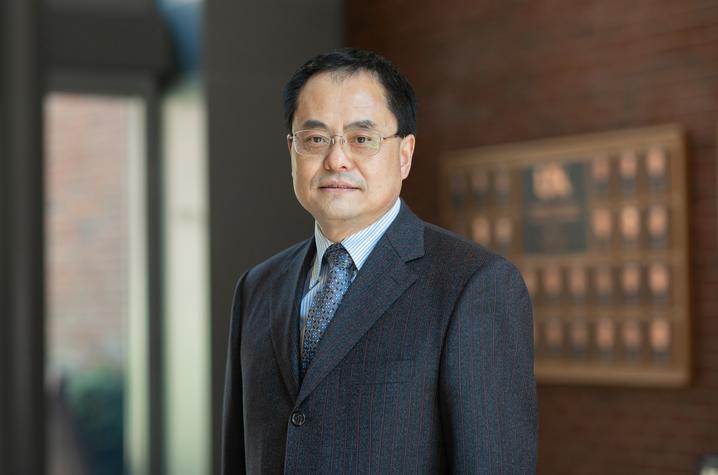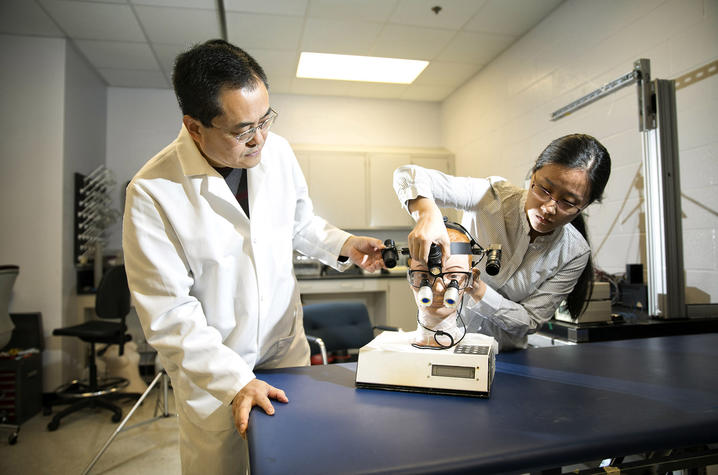Guoqiang Yu: 2024-25 University Research Professor Q&A
UKNow is highlighting the University of Kentucky’s 2023-24 University Research Professors. Established by the Board of Trustees in 1976, the professorship program recognizes excellence across the full spectrum of research at UK and is sponsored by the Office of the Vice President for Research.
LEXINGTON, Ky. (July 11, 2024) — Guoqiang Yu, Ph.D., a professor in the F. Joseph Halcomb III, M.D. Department of Biomedical Engineering in the University of Kentucky Stanley and Karen Pigman College of Engineering, has been honored as a 2024-25 University Research Professor.
Yu joined UK in 2007 and has since become a highly cited innovator — one of Elsevier’s top 2% of world’s most-cited researchers in 2023. His research focuses on developing innovative, low-cost optical imaging technologies for noninvasive monitoring of the health and function of tissues and organs.
As the primary inventor, Yu has developed and led the use of many innovative optical imaging technologies with protective patents for noninvasive diagnosis and longitudinal therapeutic monitoring of brain injury, cardiovascular disease, Alzheimer’s disease, cancer, wounds/burns, reconstructive tissue and diabetes. He holds six patents.
Yu spoke with UKNow about his latest honor as a University Research Professor in this Q&A.
UKNow: What does it mean to you to be recognized as a University Research Professor?
Yu: The University Research Professorship program not only recognizes my excellence in research but also supports my team to explore new ideas, prove new concepts and develop new bioengineering technologies for health benefits. My academic career and leadership will be further enhanced through these interdisciplinary collaborative activities across engineering and medicine as we continue to solve bioengineering challenges and advance human health.
This builds upon my 17 years here at UK, where I have established a solid bio-photonics research program. My research has been continually supported by a variety of funding agencies totaling over $55 million. I served as the single-PI on multiple grants from the National Institutes of Health (NIH) and other foundations totaling over $10 million in the past five years. In collaboration with industry, I secured over $5 million for technology translation and commercialization.
UKNow: How will the professorships program advance your research?
Yu: Over the past decade, my team has been working on the development of innovative near-infrared 3D tomographic technologies for cerebral imaging of animals and humans including neonatal subjects. While effective, these technologies require scanning of point light to many source positions, which is time consuming and complicated. As a result, functional connectivity imaging across different brain regions is not yet accessible due to the low temporal-spatial resolution.
We recently initialized the development of a revolutionary, fast, high-resolution, time-resolved laser speckle contrast imaging (TR-LSCI) technology. TR-LSCI illuminates picosecond-pulsed, widefield, coherent, near-infrared light onto the brain and synchronizes a newly developed, picosecond-gated, high-resolution, single-photon avalanche diode camera for noninvasive 2D mapping of cerebral blood flow and functional connectivity at different depths in the head.
With the support of the University Research Professorship, we will assemble a new-generation, portable TR-LSCI device and test it in head-simulating phantoms. Results from this pilot study will be used for extramural grant applications to ultimately develop a user-friendly, real-time, high-resolution, depth-sensitive and portable/mobile brain functional imager for basic neuroscience research and clinical applications.
UKNow: How does your research address challenges facing Kentucky?
Yu: Kentucky ranks consistently as one of the least healthy states in the country. Kentuckians suffer tremendous health inequities and have some of the highest national rates of the leading causes of death, cardiovascular disease, cancer, substance use, diabetes and obesity. Particularly across Appalachia, many communities face significant health challenges with limited resources.
Early diagnosis and effective treatment of all types of diseases are crucial for a positive prognosis. Currently available imaging technologies for diagnosis and therapeutic monitoring include fMRI, CT and PET, which are expensive and difficult to use continuously. By contrast, optical imaging instruments are portable, inexpensive and fast, thus enabling continuous and longitudinal monitoring of diseases.
I expect that functional information obtained by our low-cost optical imaging techniques can be ultimately used in Kentucky across Appalachia for early diagnosis of various diseases and continuous assessment of therapeutic efficacies.
UKNow: What impact will your research have on Kentucky?
Yu: In collaboration with many clinicians and scientists at the College of Medicine, we are currently testing our innovative low-cost optical imaging technologies in clinical settings for healthcare and commercialization.
In collaboration with Dr. Thomas Pittman in neurosurgery, we have developed a low-cost, wearable, eye-loupe fluorescence imaging device (U.S. Patent #11,813,118) for intraoperative identification of brain tumor margins. This innovative device won the Global Brain Race in 2019.
In collaboration with Drs. Elie G. Abu Jawdeh and Henrietta S. Bada in pediatrics and Dr. Lesley Wong in plastic surgery, we have developed an innovative optical tomographic system (U.S. Patent #9861319) for noninvasive and noncontact imaging of brains, burns, wounds and reconstructive tissues. These proprietary devices are currently under commercialization sponsored by the NIH and industry.
Most importantly, our low-cost optical imaging techniques provide many advanced features over other competitive technologies, potentially leading to lasting impacts on Kentucky healthcare.
About the University Research Professors
Each year, the University of Kentucky Board of Trustees approves a cohort of faculty as University Research Professors. The distinction recognizes excellence in work that addresses scientific, social, cultural and economic challenges in Kentucky and the world.
College leadership developed criteria for excellence within their area of expertise and then nominated faculty who excelled at these criteria. Each University Research Professor receives a one-year award of $10,000 and participates in other events planned around the program.
As the state’s flagship, land-grant institution, the University of Kentucky exists to advance the Commonwealth. We do that by preparing the next generation of leaders — placing students at the heart of everything we do — and transforming the lives of Kentuckians through education, research and creative work, service and health care. We pride ourselves on being a catalyst for breakthroughs and a force for healing, a place where ingenuity unfolds. It's all made possible by our people — visionaries, disruptors and pioneers — who make up 200 academic programs, a $476.5 million research and development enterprise and a world-class medical center, all on one campus.






